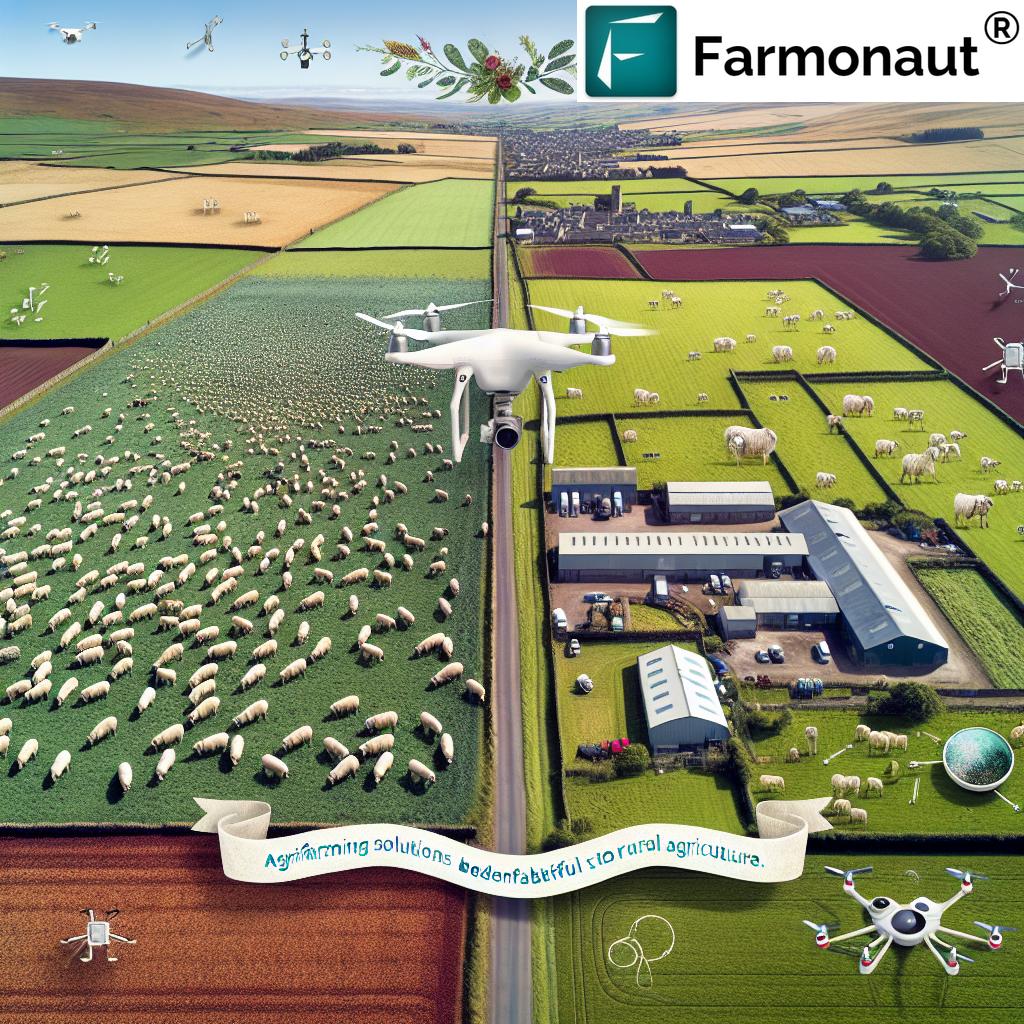Sustainable Farming in Peeblesshire: Innovative Agritech Apps for Efficient Resource Management and Livestock Breeding
“Precision farming technology can increase crop yields by up to 30% while reducing water usage by 20-50%.”
Welcome to our comprehensive guide on sustainable farming practices and agricultural resource management in Peeblesshire! In this blog post, we’ll explore cutting-edge solutions that are transforming the agricultural landscape, from precision farming technology to innovative agritech mobile apps. Whether you’re managing a small farm or overseeing large-scale operations, you’ll find valuable insights to revolutionize your farming approach and stay ahead in the ever-evolving agricultural sector.
The Rise of Sustainable Farming in Peeblesshire
Peeblesshire, nestled in the heart of Scotland’s picturesque countryside, has long been known for its rich agricultural heritage. Today, the region is at the forefront of adopting sustainable farming practices that balance environmental stewardship with economic viability. Let’s delve into the innovative techniques and technologies that are shaping the future of farming in this rural paradise.

Precision Farming Technology: A Game-Changer for Peeblesshire Farmers
Precision farming technology has revolutionized agricultural practices in Peeblesshire, allowing farmers to optimize resource use and boost productivity. Here’s how:
- Satellite Imagery: Advanced satellite technology provides real-time data on crop health, soil moisture, and vegetation indices.
- GPS-Guided Machinery: Tractors and other farm equipment use GPS for precise planting, fertilizing, and harvesting.
- Soil Sensors: In-ground sensors monitor soil conditions, enabling farmers to make data-driven decisions about irrigation and fertilization.
By implementing these technologies, Peeblesshire farmers have seen significant improvements in crop yields while reducing their environmental impact.
Agritech Mobile Apps: Farming at Your Fingertips
The rise of agritech mobile apps has put powerful farming tools directly into the hands of Peeblesshire’s agricultural community. These apps offer a range of features, including:
- Crop Monitoring: Real-time updates on crop health and growth stages.
- Weather Forecasting: Accurate, localized weather predictions to inform farming decisions.
- Pest and Disease Identification: AI-powered tools to quickly identify and address plant health issues.
- Market Prices: Up-to-date information on agricultural commodity prices.
One such innovative platform is Farmonaut, which offers advanced satellite-based farm management solutions. Farmonaut’s app provides valuable services such as real-time crop health monitoring, AI-based advisory systems, and resource management tools.
Livestock Breeding Techniques for Sustainable Farming
Peeblesshire’s farmers are adopting innovative livestock breeding techniques to improve productivity and sustainability:
- Genomic Selection: Using genetic markers to identify superior breeding stock.
- Crossbreeding Programs: Combining desirable traits from different breeds to produce hardier, more productive animals.
- Artificial Insemination: Allowing for the introduction of superior genetics without the need for on-farm breeding males.
These techniques are particularly important for the region’s sheep farmers, who are constantly looking to improve flock management and productivity.
Sheep Flock Management: Balancing Tradition and Innovation
Sheep farming is a cornerstone of Peeblesshire’s agricultural sector. Modern flock management techniques combine traditional knowledge with cutting-edge technology:
- Electronic Identification (EID): RFID tags for accurate record-keeping and monitoring of individual animals.
- Automated Weighing Systems: Regular weight monitoring to optimize feeding and identify health issues early.
- Lambing Apps: Mobile applications to track breeding cycles, lambing dates, and individual ewe performance.
These tools help farmers maintain healthy, productive flocks while reducing labor requirements.
Controlling Ticks in Livestock: A Sustainable Approach
Tick control is a significant concern for Peeblesshire’s livestock farmers. Sustainable methods for managing ticks include:
- Rotational Grazing: Moving animals between pastures to break the tick lifecycle.
- Natural Predators: Encouraging populations of tick-eating birds and insects.
- Selective Breeding: Developing livestock with increased tick resistance.
- Biological Control: Using tick-parasitic fungi or nematodes as an eco-friendly alternative to chemical treatments.
By implementing these methods, farmers can reduce reliance on chemical acaricides, promoting both animal health and environmental sustainability.
Adapting to Agricultural Policy Updates
Staying informed about agricultural policy changes is crucial for Peeblesshire farmers. Recent updates have focused on:
- Environmental Stewardship: Incentives for adopting eco-friendly farming practices.
- Rural Development Programs: Funding opportunities for farm diversification and modernization.
- Animal Welfare Standards: Updated guidelines for livestock care and management.
Farmers can stay up-to-date by attending local agricultural forums, participating in webinars, and consulting with DEFRA for the latest guidance.
“Implementing sustainable farming practices can reduce greenhouse gas emissions from agriculture by 15-20% globally.”
Rural Agriculture Innovations: Transforming the Countryside
Peeblesshire’s rural landscape is being transformed by innovative agricultural practices:
- Vertical Farming: Utilizing indoor spaces for year-round crop production.
- Agroforestry: Integrating trees and shrubs into agricultural systems for improved soil health and biodiversity.
- Renewable Energy Integration: Incorporating solar panels and wind turbines on farmland for sustainable energy production.
These innovations are helping to diversify farm income streams while promoting environmental sustainability.

Easycare Input Methods: Simplifying Farm Management
Easycare input methods are gaining popularity among Peeblesshire farmers, offering streamlined approaches to farm management:
- Automated Data Entry: Using sensors and IoT devices to automatically record farm data.
- Voice-Activated Farm Management: Employing voice recognition technology for hands-free record-keeping and task management.
- Integrated Farm Management Software: All-in-one platforms that combine financial, crop, and livestock management tools.
These methods reduce administrative burdens, allowing farmers to focus more on core farming activities.
Catchment Agriculture: A Holistic Approach to Land Management
Catchment agriculture is an emerging concept in Peeblesshire, focusing on managing agricultural practices within entire water catchment areas. This approach involves:
- Riparian Buffer Zones: Creating vegetated areas along waterways to reduce runoff and improve water quality.
- Soil Conservation Techniques: Implementing practices like contour plowing and cover cropping to prevent soil erosion.
- Collaborative Water Management: Working with neighboring farms to ensure sustainable water use across the catchment.
By adopting catchment agriculture strategies, Peeblesshire farmers are playing a crucial role in protecting local ecosystems and water resources.
Sustainable Farming Techniques Comparison
| Technique Name | Primary Benefits | Resource Efficiency | Environmental Impact | Implementation Complexity | Estimated Cost (£/hectare) | Suitable Farm Size |
|---|---|---|---|---|---|---|
| Precision Farming Technology | Optimized resource use, increased yields | High | Low | High | 500-1000 | Medium/Large |
| Agritech Mobile Apps | Real-time data access, improved decision-making | Medium | Low | Low | 50-200 | All Sizes |
| Innovative Livestock Breeding | Improved animal health and productivity | Medium | Medium | Medium | 300-600 | Medium/Large |
| Easycare Input Methods | Reduced labor, streamlined management | High | Low | Low | 100-300 | All Sizes |
| Catchment Agriculture Strategies | Improved water quality, ecosystem protection | Medium | High | High | 400-800 | All Sizes |
Wildlife Management in Agricultural Settings
Balancing agriculture with wildlife conservation is a key challenge for Peeblesshire farmers. Sustainable approaches include:
- Habitat Creation: Establishing wildlife corridors and hedgerows to support biodiversity.
- Integrated Pest Management: Using natural predators to control pest populations, reducing reliance on pesticides.
- Seasonal Adjustments: Adapting farming activities to accommodate breeding seasons of local wildlife, including sika and roe deer, rabbits, and hares.
These practices not only support local ecosystems but can also contribute to farm tourism opportunities.
Explore Farmonaut’s Satellite API for advanced agricultural insights
The Role of Technology in Modern Farming
Technology is playing an increasingly vital role in Peeblesshire’s agricultural sector. Key technological advancements include:
- Drone Technology: For crop monitoring, livestock tracking, and precision spraying.
- Blockchain for Traceability: Ensuring transparency in the food supply chain from farm to consumer.
- AI and Machine Learning: For predictive analytics in crop yield forecasting and disease detection.
These technologies are helping farmers make more informed decisions, leading to increased efficiency and sustainability.
Sustainable Resource Management in Peeblesshire Farms
Efficient resource management is crucial for sustainable farming. Peeblesshire farmers are adopting various strategies:
- Water Conservation: Implementing drip irrigation systems and rainwater harvesting.
- Renewable Energy: Installing solar panels and wind turbines to power farm operations.
- Waste Reduction: Utilizing anaerobic digesters to convert farm waste into energy and fertilizer.
These practices not only reduce environmental impact but also lead to significant cost savings in the long run.
Access Farmonaut’s API Developer Docs for integration guidance
The Future of Farming in Peeblesshire
As we look to the future, several trends are likely to shape Peeblesshire’s agricultural landscape:
- Climate-Smart Agriculture: Adapting farming practices to mitigate and adapt to climate change.
- Precision Livestock Farming: Using sensors and data analytics to monitor individual animal health and productivity.
- Urban-Rural Integration: Developing stronger links between urban consumers and rural producers through technology and education.
By embracing these trends, Peeblesshire farmers can ensure a sustainable and prosperous future for the region’s agriculture.
Conclusion: Embracing Sustainable Agriculture for a Thriving Peeblesshire
As we’ve explored throughout this blog post, sustainable farming practices and innovative agritech solutions are transforming agriculture in Peeblesshire. From precision farming technology to advanced livestock breeding techniques, farmers in this picturesque region are leading the way in balancing productivity with environmental stewardship.
By adopting these sustainable approaches, Peeblesshire farmers are not only ensuring the long-term viability of their operations but also contributing to the global effort to create a more sustainable food system. As we move forward, continued innovation, collaboration, and adaptation will be key to meeting the challenges of feeding a growing population while preserving our precious natural resources.
We encourage all farmers, whether managing small holdings or large-scale operations, to explore the technologies and practices discussed in this blog. By embracing sustainable farming methods, we can create a resilient and thriving agricultural sector that will continue to be the backbone of Peeblesshire’s rural economy for generations to come.
FAQ Section
- Q: What are the main benefits of precision farming for Peeblesshire farmers?
A: Precision farming offers increased crop yields, reduced resource usage, and more targeted application of inputs like fertilizers and pesticides. - Q: How can agritech mobile apps help small-scale farmers in Peeblesshire?
A: Agritech apps provide access to real-time data, expert advice, and market information, helping small-scale farmers make informed decisions and improve productivity. - Q: What sustainable methods are effective for controlling ticks in livestock?
A: Rotational grazing, encouraging natural predators, selective breeding for tick resistance, and using biological control agents are effective sustainable methods. - Q: How is catchment agriculture benefiting Peeblesshire’s environment?
A: Catchment agriculture improves water quality, reduces soil erosion, and enhances biodiversity by taking a holistic approach to land management. - Q: What are some easy-to-implement easycare input methods for farm management?
A: Voice-activated farm management tools, automated data entry systems, and integrated farm management software are user-friendly options for streamlining farm operations.
Farmonaut Subscriptions






